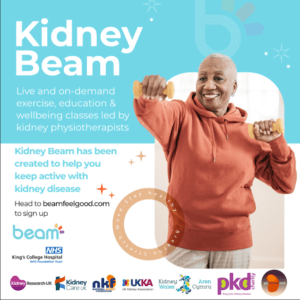What is Chronic Kidney Disease?
Chronic Kidney Disease (CKD) is when the kidneys do not work as well as they should. The word ‘chronic’ means that the disease develops over a long time and will get worse as you get older. People may not feel symptoms of kidney disease until it is very severe. This is why it is important to know if you are at risk of CKD, and if so, to have a test at least once a year to check both your blood and urine for signs.
What can I do if I am at risk of CKD?
The top causes of kidney disease are diabetes and high blood pressure. We cannot cure CKD, but there are medications and lifestyle changes that can help to slow down the disease for many people. For example, keeping blood sugars under control (if you have diabetes), and having good blood pressure is especially important – it helps to protect the kidneys, but also to reduce the risk of developing heart and blood vessel disease (known as cardiovascular disease).
It is important to stop smoking, as being a non-smoker is shown to lower the risk of CKD and heart disease. The other thing that reduces risk is eating a healthy diet and exercising regularly.
How do healthcare professionals look after people with CKD?
Your GP can monitor you if you are at risk of CKD, by checking your blood (for signs of reduced kidney function) and urine (for signs of protein, which indicates kidney damage). In North Central London, people living with CKD can be managed by their GP alongside advice and support from the kidney specialists if needed.
Your GP may recommend certain medications to protect the kidneys and heart, and they will offer advice to stop smoking, eat healthily, and exercise. Some people will need to see a kidney specialist to help manage their CKD, so a GP will refer residents to The Royal Free NHS Foundation Trust if necessary.
How can I learn more?
You can learn more by clicking the links below.
- What is Chronic Kidney Disease?
- The Urine ACR Test: Checking Kidney Health
- The Kidney Care website.
- Early stage CKD (Kidney Care UK)
- Early stage CKD – easy read (Kidney Care UK)
- The Royal Free have developed a useful resource for people diagnosed with chronic kidney disease called ‘How to look after your Kidneys’, you can find it here.
- Kidney colleagues in NHS Leicester, Leicestershire and Rutland have produced some fantastic videos about chronic kidney disease, which you can find here.
Kidney Beam
Kidney Beam is a specialist platform for people with chronic health conditions offering access to progressive programmes, live and on-demand classes, and community support. People in England living with CKD can sign up to Kidney Beam for free. When prompted, please select Royal Free London as the kidney unit you are based at.
Free webinars for people living with Chronic Kidney Disease
The Royal Free specialist kidney team are offering a free, live webinar entitled “How to Look After my Kidneys”. This is aimed at anyone with chronic kidney disease in North Central London. Family, carers, and friends can also join to understand how they can support you.
The webinar will cover:
- What is Chronic Kidney Disease?
- How can I live well with Chronic Kidney Disease?
- How will I be cared for?
You will hear from specialist kidney professionals, and have the opportunity to ask questions. Please note, we won’t be able to answer any specific questions related to your medical care. There is no need to register in advance.
To join the webinar, you can click on the link next to the date you would like to join.
Please don’t worry if you can’t see the link to the session you’d like to join, we will ensure this is uploaded to this page at least two days prior to the webinar.
Note that you may not be able to ask questions if you are not joining the webinar using the Microsoft Teams app. This is free to download and we recommend you do this to get the best from the session. You can still join and view the webinar if you decide to join on your internet browser.
To join the webinar, you can click on the link next to the date you would like to join.
2025/2026 webinar dates
18 November 9-10am Join the November Webinar
9 December 12.30 – 1.30pm Join the December Webinar
13 January 5-6pm Join the January Webinar
10 February 9-10am Join the February Webinar
17 March 12.30-1.30pm Join the March Webinar
Have you joined one of our webinars? Tell us what you think in our online feedback form.

